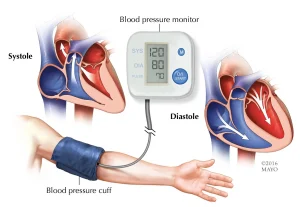
Fluctuating Blood Pressure and Its Link to Cognitive Decline: What You Need to Know
Blood pressure is a critical indicator of cardiovascular health, but its influence extends beyond the heart. Emerging research has highlighted a potential connection between fluctuating blood pressure and an increased risk of cognitive decline. Understanding this relationship is vital as we explore ways to preserve brain health and reduce the risk of conditions like dementia.
What is Blood Pressure Variability?
Blood pressure naturally varies throughout the day due to activity levels, stress, diet, and even sleep patterns. However, significant or frequent fluctuations—known as blood pressure variability (BPV)—may indicate underlying health concerns. These swings, whether within a single day or over months and years, are increasingly linked to long-term health risks, including cognitive decline.
The Connection Between Blood Pressure and Brain Health
The brain relies on a steady flow of oxygen-rich blood to function optimally. Blood pressure fluctuations can disrupt this flow, leading to:
- Reduced cerebral blood flow: Sudden spikes or drops in blood pressure can impair the delivery of oxygen and nutrients to brain cells.
- Microvascular damage: Repeated fluctuations may damage small blood vessels in the brain, increasing the risk of silent strokes and white matter lesions.
- Chronic inflammation: Irregular blood pressure can contribute to inflammatory responses, which have been implicated in neurodegenerative diseases like Alzheimer’s.
How Blood Pressure Variability Affects Cognitive Function
Research suggests that individuals with higher BPV may be more likely to experience cognitive decline over time. Key impacts include:
- Memory Impairment: Frequent fluctuations can harm the hippocampus, a brain region crucial for memory.
- Executive Dysfunction: Tasks requiring planning, decision-making, and attention may become more challenging.
- Slower Processing Speed: Irregular blood pressure can interfere with neural communication, leading to slower thinking and reaction times.
Who is Most at Risk?
Certain groups may be more vulnerable to the cognitive effects of BPV, including:
- Older Adults: Age-related vascular changes make the brain more sensitive to blood pressure fluctuations.
- Individuals with Hypertension: High blood pressure amplifies the risks associated with BPV.
- Those with Cardiovascular Conditions: Heart disease, diabetes, and a history of stroke increase susceptibility.
Can Managing Blood Pressure Protect Cognitive Health?
The good news is that stabilizing blood pressure may help reduce the risk of cognitive decline. Here’s how:
- Medication Adherence: Consistently taking prescribed antihypertensive medications can help control both average blood pressure and variability.
- Lifestyle Modifications: Regular exercise, a healthy diet (e.g., the DASH or Mediterranean diet), and stress management can promote vascular health and reduce fluctuations.
- Regular Monitoring: Home blood pressure monitoring can help detect patterns of variability and guide treatment adjustments.
- Sleep Health: Poor sleep can contribute to BPV, so addressing sleep apnea or maintaining good sleep hygiene is essential.
What Does the Research Say?
Studies have increasingly supported the link between BPV and cognitive decline:
- A 2021 study published in Hypertension found that individuals with greater BPV over five years were more likely to develop dementia.
- Research in Neurology suggests that high BPV is associated with faster cognitive decline in areas like memory and executive function.
- Evidence indicates that managing BPV early in life could prevent long-term cognitive impairment.

When to Seek Help
If you or a loved one experience symptoms such as frequent blood pressure changes, memory issues, or trouble concentrating, it may be time to consult a healthcare provider. Early intervention can make a significant difference.
The Bottom Line
Fluctuating blood pressure is more than just a cardiovascular concern—it could be a key factor in cognitive decline. By addressing BPV through lifestyle changes, medication, and regular monitoring, it’s possible to protect brain health and maintain cognitive function as you age.
Would you like to explore strategies for managing blood pressure variability or delve deeper into the research?



 DailyMediCure
DailyMediCure 









